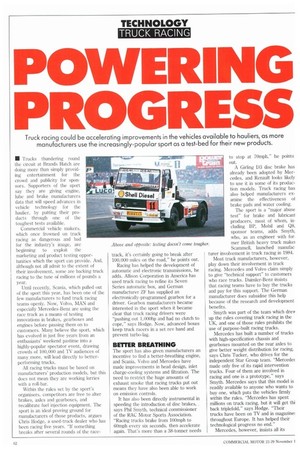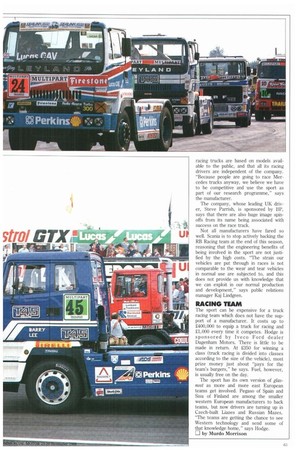1 2 1211111Ell
Page 64

Page 65

If you've noticed an error in this article please click here to report it so we can fix it.
rolt4:0Glit 55
Truck racing could be accelerating improvements in the vehicles available to hauliers, as more manufacturers use the increasingly-popular sport as a test-bed for their new products.
• Trucks thundering round the circuit at Brands Hatch are doing more than simply providing entertainment for the crowd and publicity for sponsors. Supporters of the sport say they are giving engine. lube and brake manufacturers data that will speed advances in vehicle technology for the haulier, by putting their products through one of the toughest tests available.
Commercial vehicle makers. which once frowned on truck racing as dangerous and bad for the industry's image, are beginning to exploit the marketing and product testing opportunities which the sport can provide. And, although not all admit to the extent of their involvement, some are backing truck racing to the tune of millions of pounds a year.
Until recently, Scalia, which pulled out of the sport this year, has been one of the few manufacturers to fund truck racing teams openly. Now, Volvo, MAN and especially Mercedes-Benz are using the race track as a means of testing innovations in brakes, gearboxes and engines before passing them on to customers. Many believe the sport, which has evolved in just five years from an enthusiasts' weekend pastime into a highly-popular spectator event, drawing crowds of 100,000 and Tv audiences of many, more, will lead directly to betterperforming trucks.
All racing trucks must be based on manufacturers' production models, but this does not mean they are working lorries with a roll-bar.
Within the rules set by the sport's organisers, competitors are free to alter brakes, axles and gearboxes, and recalibrate fuel injection equipment. 'rhe sport is an ideal proving ground for manufacturers of those products, argues Chris Hodge, a used-truck dealer who has been racing five years. "If something breaks after several rounds of the race track, it's certainly going to break after 100,000 miles on the road," he points out.
Racing has helped the development of automatic and electronic transmissions, he adds. Allison Corporation in America has used truck racing to refine its Seven Series automatic box. and German manufacturer ZF has supplied an electronically-programmed gearbox for a driver. Gearbox manufacturers became interested in the sport when it became clear that truck racing drivers were "pushing out 1,000hp and had no clutch to cope," says Hodge. Now, advanced boxes keep truck racers in a set rev band and prevent turbo-lag.
BETTER BREATHING
The sport has also given manufacturers an incentive to find a better-breathing engine, and Scalia, Volvo and Mercedes have made improvements in head design, inlet charge-cooling systems and filtration. The need to restrict the huge amounts of exhaust smoke that racing trucks put out means they have also been able to work on emission controls.
It has also been directly instrumental in speeding the introduction of disc brakes, . says Phil Smyth, technical commissioner of the RAC Motor Sports Association. "Racing trucks brake from 100mph to 60mph every six seconds, then accelerate again. That's more than a 38-tonner needs to stop at 70mph," he points out.
A Girling D3 disc brake has already been adopted by Mercedes, and Renault looks likely to use it in some of its production models. Truck racing has also helped manufacturers examine the effectiveness of brake pads and water cooling.
The sport is a "major abuse test" for brake and lubricant producers, most of whom, including BP, Mobil and Q8, sponsor teams, adds Smyth, who, as an engineer with for.
er. mer British heavy truck makei Scammell, launched manufac turer involvement in truck racing in 1984.
Most truck manufacturers, however, play down their involvement in truck racing. Mercedes and Volvo claim simply to give "technical support" to customers who race trucks. Daimler-Benz insists that racing teams have to buy the trucks and pay for this support. The German manufacturer does subsidise this help because of the research and development benefits.
Smyth was part of the team which drev up the rules covering truck racing in the UK, and one of those rules prohibits the use of purpose-built racing trucks.
Mercedes has built a number of trucks with high-specification chassis and gearboxes mounted on the rear axles to give better weight distribution for racing, says Chris Tucker, who drives for the independent Star Group team. "Mercedes made only five of its rapid intervention trucks. Four of them are involved in racing and one is a prototype," says Smyth. Mercedes says that this model is readily available to anyone who wants to buy one, which puts the vehicles firmly within the rules. "Mercedes has spent millions on truck racing, but it will get thi back triplefold," says Hodge. "Their trucks have been on TV and in magazine: throughout Europe. It has helped their technological progress no end."
Mercedes, however, insists all its racing trucks are based on models available to the public, and that all its racing drivers are independent of the company. "Because people are going to race Mercedes trucks anyway, we believe we have to be competitive and use the sport as part of our research programme," says the manufacturer.
The company, whose leading UK driver, Steve Parrish, is sponsored by BP, says that there are also huge image spinoffs from its name being associated with success on the race track.
Not all manufacturers have fared so well. Scania is to stop actively backing the RB Racing team at the end of this season, reasoning that the engineering benefits of being involved in the sport are not justified by the high costs. "The strain our vehicles are put through in races is not comparable to the wear and tear vehicles in normal use are subjected to, and this does not provide us with knowledge that we can exploit in our normal production and development," says public relations manager Kaj Lindgren.
RACING TEAM
The sport can be expensive for a truck racing team which does not have the support of a manufacturer. It costs up to £400,000 to equip a truck for racing and £1,000 every time it competes. Hodge is sponsored by Iveco Ford dealer Dagenham Motors. There is little to be made in return. At £350 for winning a class (truck racing is divided into classes according to the size of the vehicle), most prize money just about "pays for the team's burgers," he says. Fuel, however, is usually free on the day.
The sport has its own version of glasnost as more and more east European teams get involved. Pegaso of Spain and Sisu of Finland are among the smaller western European manufacturers to back teams, but now drivers are turning up in Czech-built Liazes and Russian Mazes. "The teams are getting the chance to see Western technology and send some of that knowledge home," says Hodge.
by Murdo Morrison




































































































































































